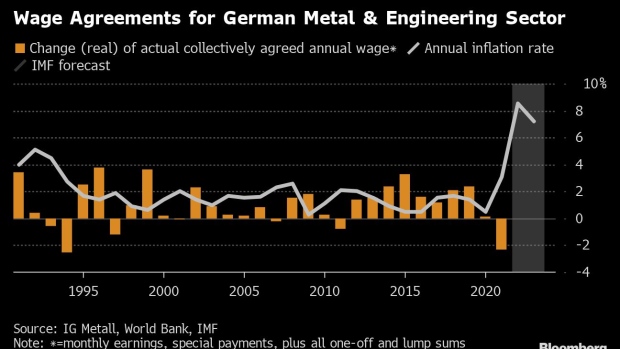Nov 18, 2022
German Labor Union Wins 8.5% Wage Hike to Counter Inflation
, Bloomberg News

(Bloomberg) -- Germany’s largest labor union and employers agreed on two rounds of wage increases for industrial workers, averting the threat of strike action in Europe’s biggest economy.
The IG Metall union said Friday the deal in the state of Baden-Wuerttemberg will raise pay 5.2% next year and 3.3% in 2024, on top of €3,000 ($3,110) in tax-free bonus payments to counter inflationary pressures. The union has recommended the agreement to eventually cover some 3.9 million workers in Germany’s industrial sector to help compensate for soaring living costs.
“Employees will soon have significantly more money in their pockets -- permanently,” IG Metall chairman Joerg Hofmann said in a statement. The deal represents a 8.5% wage increase, the union said, without clarifying how it calculated the hike.
The talks between IG Metall and the Gesamtmetall employers’ association have been one the most significant domestic showdowns of Europe’s energy crisis so far. Companies had been reluctant to increase wages due to rising costs for raw materials, natural gas and electricity.
At the same time, there’s been concern that significantly higher pay might risk entrenching already-high inflation. German consumer-price growth unexpectedly accelerated in October, following a trend already seen in France and Italy.
The pay deal “won’t be enough to fully offset the drop in purchasing power caused by higher inflation but it softens the damage,” said Carsten Brzeski, an economist at ING in Frankfurt. “For the ECB, it signals that second-round effects remain dampened but that at the same time a lower, subdued inflationary pressure can last for longer than markets currently think.”
Some 900,000 workers had participated in walkouts prior to the agreement, affecting companies including auto-parts maker Robert Bosch GmbH. Industrial workers typically need to drive to out-of-town production sites, meaning they’re more exposed to the increased cost of fuel.
While the pay hike is burdening companies’ competitiveness, further strikes would have done even more damage, the Gesamtmetall employers’ group said Friday.
“The agreement is an advance on the growth that we hope to see again from 2024,” Gesamtmetall President Stefan Wolf said in a statement.
(Updates with economist comment in sixth paragraph.)
©2022 Bloomberg L.P.


